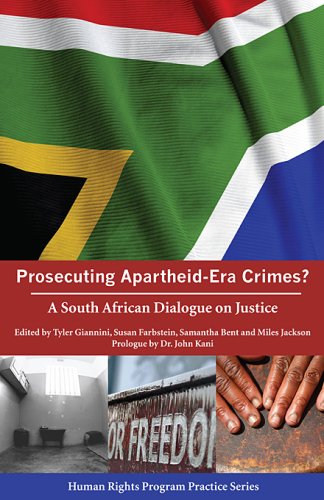Items related to Prosecuting Apartheid-Era Crimes?: A South African...
Prosecuting Apartheid-Era Crimes?: A South African Dialogue on Justice (International Human Rights Program Practice Series) - Softcover

Synopsis
In December 2005, South Africa’s National Prosecuting Authority (NPA) promulgated a controversial policy on the prosecution of apartheid-era crimes, sparking renewed debate about such prosecutions and their role in the transition to democracy since 1994. The book presents a diverse collection of perspectives on prosecutions in South Africa, including a foreword by playwright and actor John Kani. Other reflections from former Truth and Reconciliation Commission (TRC) commissioners, survivors of apartheid, civil society members, and government officials outline the serious questions facing South Africa as it deals with prosecutions today.
The book traces the history of the prosecutions in South Africa including their relationship to the TRC and a recent legal challenge that asserts the NPA policy is an unconstitutional re-run of the TRC amnesty process. Throughout, the book highlights the important themes related to any post-conflict prosecution scheme including rule-of-law concerns, questions of evenhandedness and moral relativism, competing priorities and resource allocation, the limits of a court-centered approach to justice, and the potential transformative power of prosecutions.
"synopsis" may belong to another edition of this title.
About the Author
Tyler Giannini is Lecturer on Law and Clinical Director of the Human Rights Program at Harvard Law School.
"About this title" may belong to another edition of this title.
- PublisherHuman Rights Program, Harvard Law School
- Publication date2009
- ISBN 10 0979639514
- ISBN 13 9780979639517
- BindingPaperback
- LanguageEnglish
- Number of pages170
- EditorGiannini Tyler, Farbstein Susan, Bent Samantha, Jackson Miles
Shipping:
FREE
Within U.S.A.
Search results for Prosecuting Apartheid-Era Crimes?: A South African...
Prosecuting apartheid-era crimes : a South African dialogue on justice
Seller: CorgiPack, Fulton, NY, U.S.A.
Paperback. Condition: Like New. Gift inscr. at title page; else as new. Appears as new and unread. 1 vol. (X-160 p.) ; 23 cm. Contents:Prologue: "You should use the past as a reference, lest you forget"/ John Kani -- Chapter 1. South Africa's Ongoing Pursuit of Justice. Reflection: "Anyone who says applying for amnesty was easy or a soft option is wrong. Many who applied were as broken as the victims of their acts" / Ilan Lax -- Chapter 2. The TRC and Its Unfinished Business. Reflection: "I know they talk about reconciliation at a national level. But with me, as a person, as someone who's gone through the pain, I feel like I also need revenge" / Nombuyiselo Mhlauli -- Reflection: "A process for bringing together victims and offenders is very important"/ Paddy Kearney -- Chapter 3. Prosecutorial Powers in South Africa. Reflection: "In South Africa, we have to be careful of a slide into impunity"/ Yasmin Sooka -- Reflection: "A vigorous prosecutions policy, where we had nothing for seven or eight years, would seem a bit strange"/ Robin Palmer -- Reflection: "[We] have to reconcile ourselves with ourselves." Anonymous -- Chapter 4. Prosecutions Policy at Work. Reflection: "Prosecutions will take the country backward"/ Jan Wagener -Reflection: "We can't prosecute everybody . [but] we can't not prosecute anyone" / Dumisa Ntsebeza -- Reflection: "The Vlok plea: it wasn't a disclosure. It was an apology to Frank Chikane" / Pumla Godobo-Madikizela -- Chapter 5. Prosecutions: Reflecting Back, Moving Forward. Reflection: "The only way you're going to find out what happened is if you get someone to come and disclose . [D]o you think theyre going to tell us in the context of a court case, where they're pleading innocent? They're not" / Madeleine Fullard. Reflection: "Justice is an ongoing paradigm"/ Jody Kollapen -- Appendix A. Prosecuting Policy and Directives Relating to the Prosecution of Offences Emanating from Conflicts of the Past and Which Were Committed on or Before 11 May 1994 -- Appendix B. Promotion of National Unity and Reconciliation Act (Act No. 34 of 1995, The "TRC ACT") -- Appendix C. Criminal Procedure Act (Act No. 51 of 1977) -- Appendix D. Plea and Sentence Agreement, State v. Ngoma, Nthlabathi, Nkithi, and Phalaphala ("The APLA Four") -- Appendix E. Individuals Interviewed. Restorative justice -- South Africa. Crimes against humanity -- South Africa. Prosecution -- South Africa. Seller Inventory # 075543
Quantity: 1 available
